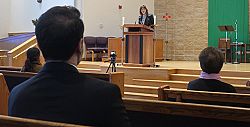Speakers at Respect for the Dignity of Life Day seminar address a range of pro-life issues

SANDY — Helping people who struggle was the focus of the Diocesan Respect for the Dignity of Life Day Seminar Jan. 28 at Blessed Sacrament Catholic Church.
Three speakers focused on the topics of people who face mental health issues, youth facing the pressures of the modern world, and those who are seeking to find their path in life.
Vicar Jeremy LaMont of Grace Lutheran Church spoke on “Human Dignity and Building a Culture of Life” — understanding the human conscience and how it plays a role in life ministry. It is important for Christians to understand the Biblical definition of conscience, he said. “This is not a Jiminy Cricket ‘Always let your conscience be your guide’ conception.”
“For those who are afflicted with physical and mental trouble, a recognition of the value of their own life, even when they are not properly able to assess it for themselves, is critical,” he said. “Their value as the Bible describes it is that the Son of God paid for his or her life with his very blood on the cross, and this is the only way that the problems of the heart and conscience can be fully, truly resolved.”
“How do we talk to people inside the church and outside about the value of humanity paid for by the blood of Christ?” he asked. “As Christians engage the world outside the church, the way that we understand the conscience is actually a key point of concern in maintaining a foundational culture of life especially as we talk to people who do not hold to a Christian ethic regarding humanity.”
In his talk “Raising up Joshuas Through Outreach to the Youth of the Diocese,” diaconate aspirant Michael Edwards shared information about the Joshua Project, a diocesan initiative of which he and Father Gustavo Vidal, pastor of St. Rose of Lima Parish in Layton, are co-chairs. The project is intended to help youth stay involved in the Church and to help address the root causes of teen suicide.
“The sanctity and the beauty of life is very, very important, and teen suicide in Utah is definitely growing,” Edwards said. “Being a teacher in the classroom for 27 years, I can tell you first-hand that Covid did not help for our youth. It was definitely detrimental for the psyche of a lot of our children, a lot of our teenagers. Being separated from one another and going to school online and not having that idea of community definitely hurt. The idea of bringing our teens back into that sense of community is something that was really on the heart of Fr. Vidal and of Bishop [Oscar A.] Solis.”
The Joshua Project will hold a kick-off rally on Feb. 18 at St. Rose of Lima Catholic Church, where the life of Blessed Carlos Acutis will be highlighted, Edwards said. “We’ve taken Carlos Acutis … to be our model. He was very involved in the internet and social media online and the Eucharist. We figured he was the best model for a lot of our youth going forward.”
In her presentation, “Mental Health Awareness: Accompanying Those Who Suffer,” Amy Davis spoke about the basic practices of mental health.
Davis, a practicing Catholic, is a mental health counselor who also serves as a counselor for the diocese’s Project Rachel, which helps those who have been involved with abortion. She worked for several years in her field but felt “gagged as a Christian,” she said, and began her own practice, which has an emphasis on Catholic spirituality.
“It is such a privilege because I can speak about truth when people come in for help,” she said. “That means I can actually help them.”
Being in touch with truth and being grounded in reality is essential for good mental health, Davis said. “It is very important that we understand where we are in this earthly existence that we’re in.”
Along with knowing where they are, God’s children must know who they are and who they are not, Davis said.
“As fallen humanity we have lost our state of grace in God,” she said. “We are all blind in some way and deaf in some ways and inert and cannot move on our own, and we are all in need of Christ’s healing in our lives. Those of us that recognize this fact can make a lot of progress.”
Finally, knowing who God is is critical to mental health “because he created us,” she said. “We are the bone of his bone, we are the flesh of his flesh. We cannot be happy in this life and at peace if we do not know him, and if we don’t get to know him it will be to our eternal ruin.”
The Diocesan Respect for the Dignity of Life Day Seminar event was held both in-person and virtually. The majority of participants this year chose to view the presentations online, said Crystal Painter, director of the diocesan Office of Marriage and Family Life.
© Copyright 2024 The Diocese of Salt Lake City. All rights reserved.

Stay Connected With Us